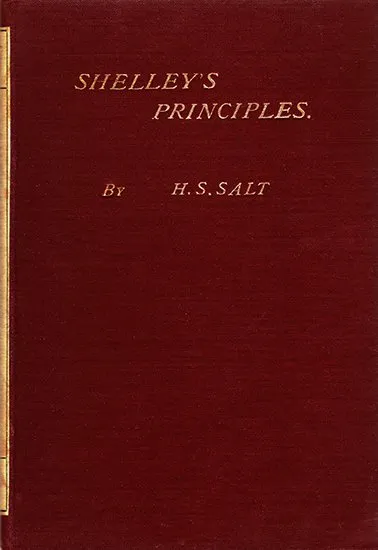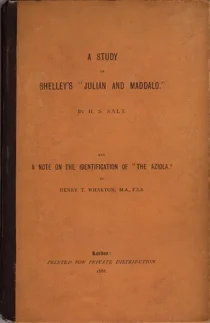
Shelley’s Principles, Has Time Refuted or Confirmed Them? A Retrospect and Forecast
Henry S. Salt
- Publisher: Reeves and Turner, London
- Published: 1892
- Length: 82 pages
- Format: Hardback
- First Edition Reprint
- 1977 Haskell House Publishers Ltd., Brooklyn, New York
Summary
Shelley’s Principles by Henry S. Salt is a thought-provoking exploration of Percy Bysshe Shelley’s legacy, defending him as both a lyrical genius and a profound thinker. Originally presented at a Shelley Society meeting, the essay responds to a challenge by Professor Dowden to examine Shelley’s originality beyond his poetry. Salt argues that Shelley’s work, deeply intertwined with his visionary ideas on society and human rights, deserves recognition not only for its artistic brilliance but also for its intellectual depth.
Published during Shelley’s centenary, Salt critiques the evolving views of the poet—from demonized rebel to “ineffectual angel”—and champions a more authentic appreciation of Shelley’s moral courage. Despite harsh criticism from conservative circles, Salt remains steadfast in portraying Shelley as a poet and thinker whose principles continue to resonate. Essential for fans of Romantic poetry and literary criticism, Shelley’s Principles offers a bold, timeless defence of Shelley’s unity of life, art, and philosophy.
Contents
- Retrospect
- Three Stages of Shelley Criticism
- Shelley's Principles
- Shelley's Ideals
- Conclusion and Forecast
What the Critics Said
“Has time refuted or confirmed Shelley’s principles, is the question which Mr. Salt endeavours to answer, and the answer is that it has confirmed them. The growing appreciation of this great poet is one of the most significant facts of our time.”—The Echo.
“Mr. Salt shows conclusively that Shelley’s art had an ethical base.”—Library Review.
‘The least appreciative reader can scarcely deny that many of the principles which to Shelley’s contemporaries appeared outrageous, are now either wholly or partially accepted.”—Manchester Guardian.
“Shelley, in many matters, simply anticipated his age by a century; apologies for him are no longer in fashion.”—The Critic (New York).
“The position which Shelley must occupy in the history of Sociology entitles Mr. Salt to claim for that great poet a high rank as the prophet of a larger, saner morality. Mr. Salt has discussed the question with admirable tact and ability.”—Westminster Review.
“An interesting part of Mr. Salt’s Essay is that in which he traces the change in the critic’s attitude towards Shelley. At first the poet was a monster of depravity; now he is a beautiful and ineffectual angel; by and bye his character and teaching will be accepted as no less valuable than his poetry.”’—Freethinker.
“Mr. Salt is at his best in insisting on the necessity for the impartial critic to distinguish between Shelley’s perfervid expression in his poems, of his social and political beliefs, and those in his prose writings,”—Vanity Fair.
“Mr, Salt urges, and with justice, that many of the opinions for which Shelley was doomed to social ostracism are now common-places among forward thinkers and reformers.’—Bradford Observer.
“An interesting retrospect and forecast of the work of Shelley and its effect. The centenary of Shelley’s birth certainly marks a wondrous change in the estimation in which he is held both as a poet and man.”—Weekly Times & Echo.
“Although Shelley the poet no longer needs defence, there is still ample scope for the championship of Shelley the revolutionary.”—Morning Leader,
“It remains perfectly true that a dozen of Shelley’s most upsetting opinions are among those destined to conquer; that his political ideal is fast gaining ground; that his social speculations are seen to have much more validity than had been supposed; and that he has had a widening influence for good on three generations.”—National Reformer.




